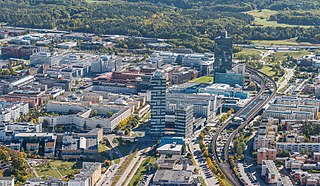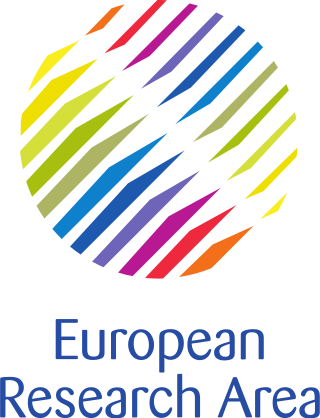
Kista is a district in the borough of Rinkeby-Kista, Stockholm, Sweden. It has a strategic position located in between Sweden's main airport, the Stockholm-Arlanda International Airport and central Stockholm, and alongside the main national highway E4 economic artery. Kista comprises residential and commercial areas, the latter in the highly technological telecommunication and information technology industry. There are large research efforts in this entire area, which therefore is dubbed Kista Science City. It is the research park of KTH Royal Institute of Technology.
The knowledge economy, or knowledge-based economy, is an economic system in which the production of goods and services is based principally on knowledge-intensive activities that contribute to advancement in technical and scientific innovation. The key element of value is the greater dependence on human capital and intellectual property as the source of innovative ideas, information and practices. Organisations are required to capitalise on this "knowledge" in their production to stimulate and deepen the business development process. There is less reliance on physical input and natural resources. A knowledge-based economy relies on the crucial role of intangible assets within the organisations' settings in facilitating modern economic growth.

The Lisbon Strategy, also known as the Lisbon Agenda or Lisbon Process, was an action and development plan devised in 2000, for the economy of the European Union between 2000 and 2010. A pivotal role in its formulation was played by the Portuguese economist Maria João Rodrigues.
The National Innovation System is the flow of technology and information among people, enterprises and institutions which is key to the innovative process on the national level. According to innovation system theory, innovation and technology development are results of a complex set of relationships among actors in the system, which includes enterprises, universities and government research institutes.
The concept of the innovation system stresses that the flow of technology and information among people, enterprises, and institutions is key to an innovative process. It contains the interactions between the actors needed in order to turn an idea into a process, product, or service on the market.

The Joint Research Centre (JRC) is the European Commission's science and knowledge service which employs scientists to carry out research in order to provide independent scientific advice and support to European Union (EU) policy.

The Directorate-General for Research and Innovation is a Directorate-General of the European Commission, located in Brussels, and responsible for the European Union's research and innovation policy and coordination of research and innovation activities. Until her resign in May 2023, DG RTD was headed by Commissioner Mariya Gabriel and Director-General Marc Lemaître.

The European Research Area (ERA) is a system of scientific research programs integrating the scientific resources of the European Union (EU). Since its inception in 2000, the structure has been concentrated on European cooperation in the fields of medical, environmental, industrial, and socioeconomic research. The ERA can be likened to a research and innovation equivalent of the European "common market" for goods and services. Its purpose is to increase the competitiveness of European research institutions by bringing them together and encouraging a more inclusive way of work, similar to what already exists among institutions in North America and Japan. Increased mobility of knowledge workers and deepened multilateral cooperation among research institutions among the member states of the European Union are central goals of the ERA.
The European Institute of Innovation and Technology (EIT) is an independent body of the European Union with juridical personality, established in 2008 intended to strengthen Europe's ability to innovate. The EIT’s three “core pillars” of activities are: entrepreneurial education programmes and courses across Europe that transform students into entrepreneurs; business creation and acceleration services that scale ideas and budding businesses; and innovation-driven research projects that turn ideas into products by connecting partners, investors, and expertise.

Linnar Viik is an Estonian information technology scientist, entrepreneur and IT visionary.
Service innovation is used to refer to many things. These include but not limited to:
- Innovation in services, in service products – new or improved service products. Often this is contrasted with “technological innovation”, though service products can have technological elements. This sense of service innovation is closely related to service design and "new service development".
- Innovation in service processes – new or improved ways of designing and producing services. This may include innovation in service delivery systems, though often this will be regarded instead as a service product innovation. Innovation of this sort may be technological, technological - or expertise -based, or a matter of work organization.
- Innovation in service firms, organizations, and industries – organizational innovations, as well as service product and process innovations, and the management of innovation processes, within service organizations.
The technological innovation system is a concept developed within the scientific field of innovation studies which serves to explain the nature and rate of technological change. A Technological Innovation System can be defined as ‘a dynamic network of agents interacting in a specific economic/industrial area under a particular institutional infrastructure and involved in the generation, diffusion, and utilization of technology’.
The High Tech Campus Eindhoven is a high tech center and R&D ecosystem on the Southern edge of the Dutch city of Eindhoven. In 2016, the High Tech Campus is home to more than 140 companies and institutions, comprising over 10,000 product developers, researchers and entrepreneurs and an estimated 85 nationalities. The Financial Times, Fortune, Forbes and others have praised the High Tech Campus Eindhoven (HTCE) as one of the best locations in the world for high-tech venture development and startup activity. As such, the HTCE is an innovation district, a targeted area with a huge potential for innovation and entrepreneurship.
A Technological Top Institute (TTI) (Dutch: Technologisch topinstituut) is a special type of research institute at a Dutch research university. A TTI carries out scientific research in areas that:
- have been designated to be of key importance to the Netherlands by the Dutch government; and that
- is subject to such industry interest that it can be funded by public–private partnership agreements.
Alexander von Gabain is a microbiologist, academic, founder of several biotech firms and board member of venture capital firms. He has worked at the intersection of the healthcare industry, academia and research throughout his career. He was one of the founding board members of EIT in 2008 and began his involvement in EIT Health in 2015.
Innovation districts are urban geographies of innovation where R&D strong institutions, companies, and other private actors develop integrated strategies and solutions to develop thriving innovation ecosystems–areas that attract entrepreneurs, startups, and business incubators. Unlike science parks, innovation districts are physically compact, leverage density and high levels of accessibility, and provide a “mash up” of activities including housing, office, and neighborhood-serving amenities. Districts signify the collapse back of innovation into cities and is increasingly used as a way to revitalize the economies of cities and their broader regions. As of 2019, there are more than 100 districts worldwide.
The European Innovation Council (EIC) was introduced by the European Commission to support the commercialization of high-risk, high-impact technologies in the European Union. The fully-fledged EIC was launched March 2021 under Horizon Europe and is incorporated within the European Innovation Council and SMEs Executive Agency (EISMEA). Its goal is to aid researchers, start-ups and SMEs bring their innovations to market by providing funding, networking and partnership opportunities, and business acceleration services. In its latest form, the concept has been put forth by the EU Research Commissioner Carlos Moedas in mid-2015. The EIC has a budget of €10.1 billion to support innovations throughout the lifecycle from early stage research, to proof of concept, technology transfer, and the financing and scale up of start-ups and SMEs.
The National Documentation Centre is a Greek public organisation that promotes knowledge, research, innovation and digital transformation. It was established in 1980 with funding from the United Nations Development Programme with the aim to strengthen the collection and distribution of research-related material, and to ensure full accessibility to it. It has been designated as a National Scientific Infrastructure, a National Authority of the Hellenic Statistical System, and National Contact Point for European Research and Innovation Programmes. Since August 2019, it has been established as a discrete public-interest legal entity under private law, and is supervised by the Ministry of Digital Governance. The management bodies of EKT are the Administrative Board and the Director who, since 2013, has been Dr. Evi Sachini.

Florence Gschwend is a Swiss chemical engineer and Royal Academy of Engineering Enterprise Fellow at Imperial College London. She is the founder and CEO of Lixea, a spin-out company that commercialises wood fractionation to enable a circular bioeconomy.




